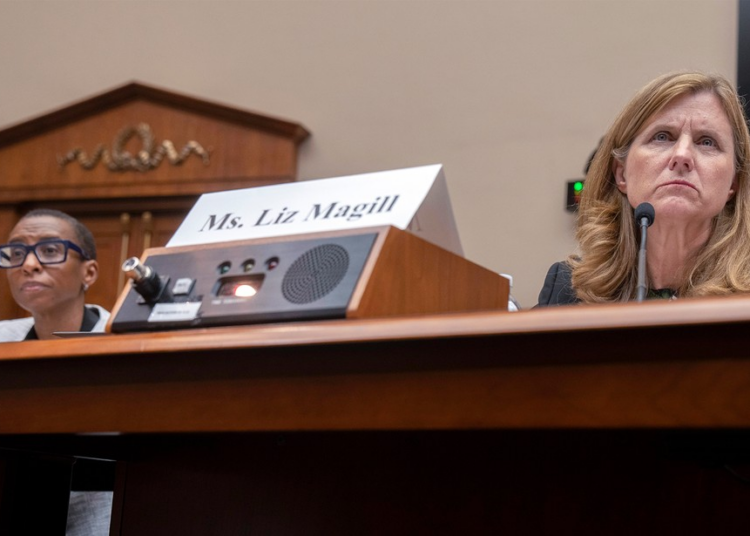It is unclear whether or not disgraced former UPenn President Liz Magill was invited to participate in the trip to show solidarity to Israel after her disastrous performance during a congressional hearing.
A group of about thirty faculty members of the University of Pennsylvania went to Israel this week on a three-day solidarity visit. They arrived on Tuesday. They have met with President Isaac Herzog and they have taken a group photo inside a bomb shelter during their visit to Kibbutz Kfar Aza in the south of Israel. The photo was taken after the all-clear siren alerted the community.
Their packed itinerary included meetings with government officials, visits to major universities and a tour of devastated communities in the Gaza envelope, where hundreds were brutally tortured and murdered on October 7.
The group is also scheduled to meet with Penn alumni and attend an academic conference on trauma at Tel Aviv University on Thursday before returning to the US.
Ron Berman, Associate Professor of Marketing at Wharton, said the group is on a mission to build bridges with Israeli academic community members and to see the impact of the Hamas attacks.
Touring within the Gaza envelope, we were rushed into a bomb shelter when rockets went off within a few km of our group. We were told Iron dome took them out. pic.twitter.com/tLr1KFLcDC
— Claire Finkelstein (@COFinkelstein) January 3, 2024
If Iron dome hadn’t saved us, hopefully this bomb shelter would have. https://t.co/kUVfdjX2Vu pic.twitter.com/MUPqeootuH
— Claire Finkelstein (@COFinkelstein) January 3, 2024
In an interesting twist, it sounds as though this group is supportive of Israel, not Hamas, as many of their colleagues are. How refreshing for a group of college faculty members to sound like decent human beings and not make excuses for Hamas.
The delegation, led by Professors Michael Kahana and Peter Decherney, stressed the apolitical nature of their visit.
‘We have no political purpose, except that I suppose it’s political nowadays, just to show up as a group of faculty in Israel, but it shouldn’t be political,’ he said.
Professor Kahana expressed concern over the lack of empathy Israeli researchers felt from international colleagues after the traumatic events.
He described the feeling as ‘painful and hurtful’ and hoped that the visit would strengthen the resolve to support the Israeli academy.
Kahana also expressed hope that ‘out of this meeting today, we can come back to the United States and strengthen our resolve to support the Israeli academy going forward.’
At first I thought that this was an apology tour to smooth over hard feelings over the performance of President Liz Magill and the other two poison ivy presidents during that congressional hearing. But, this group sounds sincere in efforts to bond with the Israel officials and academics. They may not be liberals looking for publicity at the expense of grieving Israelis.
Until three months ago, University of Pennsylvania psychology professor Michael Kahana said he had never felt the need to wear a yarmulke, or Jewish skullcap, to his classes.
“It started Oct. 7. I now feel that if I don’t wear a yarmulke then my students might not feel that they can,” said Kahana, one of the organisers of some 30 Penn faculty on a solidarity mission to Israel this week.
Lead by example, Professor Kahana. Well done. Kahana spoke up for Magill but voiced disappointment that many Penn professors did not condemn Hamas. He doesn’t think Magill is antisemitic.
“It was deeply painful that after Oct. 7 so many of my colleagues saw it perfectly fit to condemn Israel … they didn’t see it fit to say anything about the atrocities of Hamas,” Kahana said at a dinner with Hebrew University faculty and students. “Why couldn’t they express sympathy after Oct. 7?”
Claire Finkelstein, director of Penn’s Center for Ethics and Law, said anti-Israel sentiment on college campuses predates the Oct. 7 attack on Israel. She cited the pro-Palestinian BDS movement – or boycott, divestment, sanctions – founded in 2005.
Critics of the movement say it is discriminatory and aims to economically hobble and undermine the Jewish state.
“There’s a very, very strong sentiment on campus that is pro-Palestinian and anti-Israel,” Finkelstein said of Penn. “For many of us who are supportive of Israel, that has been very painful, and many of us feel that it is based on a fundamental lack of understanding of the situation on the ground here.”
She blamed some antisemitism on U.S. secondary education, where European history and the Holocaust are taught less and conflicts are portrayed as between oppressors and oppressed.
“It’s never too late for an educational institution to educate and that’s what this is all about,” she said.
It’s good to know there are reasonable people on college campuses, especially the most elite ones. The criticism these professors offer, knowing they may suffer consequences from their pro-Hamas colleagues, is richly deserved. It restores hope for humanity.

